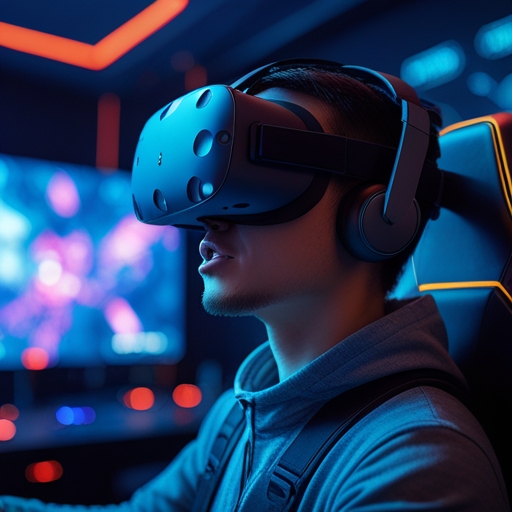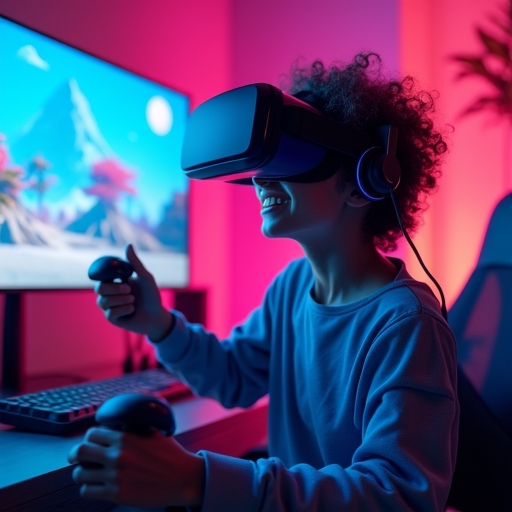
Revolutionizing Play: Virtual Reality’s Impact on Gaming
Welcome to a new era of gaming, where the lines between the physical and digital worlds blur more every day. Virtual Reality (VR) technology has not merely added another layer to the gaming experience; it has fundamentally transformed it. From immersive role-playing games to adrenaline-pumping action adventures, VR is reshaping what it means to play, interact, and escape into alternate realities. Let’s dive into how VR technology is revolutionizing the gaming industry, creating unparalleled experiences, and what this means for gamers and developers alike.
The Evolution of Virtual Reality in Gaming
Virtual Reality technology, once a mere figment of science fiction, has become a tangible, transformative tool in the gaming world. Initial VR systems, which emerged prominently in the early 2010s, offered novel experiences but were often hindered by high costs and limited content. Today, advancements in VR hardware and software have dramatically improved user experience, making it more accessible and enjoyable. With companies like Oculus, HTC, and Sony leading the charge, VR gaming has moved from niche to mainstream.
Technological Enhancements
Current VR setups feature higher resolution displays, more accurate tracking systems, and more comfortable headsets, which collectively enhance the immersive experience. The introduction of hand-tracking and full-body tracking technologies allows players to interact with the virtual environment in a more natural and intuitive way, significantly enhancing the sense of presence within the game.
Broader Content Availability
As the technology has matured, so too has the variety of games available. From independent developers to major gaming studios, the industry has embraced VR, crafting experiences that leverage the medium’s strengths. Games like “Beat Saber” and “Half-Life: Alyx” have shown that VR can host a range of genres, from rhythm-based games to complex narrative-driven adventures.

Transforming Gaming Experiences
Virtual Reality introduces a new dimension to gaming – a true sense of ‘being there’ that cannot be replicated by traditional screens. This immersion is perhaps the most revolutionary aspect of VR, offering gamers experiences that are as emotionally engaging as they are visually spectacular.
Enhanced Immersion and Interaction
In VR, players are not just observers but active participants in the game’s world. This involvement leads to deeper emotional connections to the game’s content. For example, horror games in VR such as “Resident Evil 7: Biohazard” amplify the fear factor to unprecedented levels, making the terror feel all too real.
Social and Multiplayer Advancements
VR also expands the social aspects of gaming. Platforms like VRChat and multiplayer modes in games such as “Rec Room” demonstrate how VR can create communal spaces where players can interact realistically, despite being physically apart. This has significant implications for the future of social interaction, particularly in a world increasingly driven by digital connections.
The Future and Challenges of VR Gaming
As we look to the future, the trajectory for VR gaming is steeply upward, but not without its hurdles. The continued success and growth of VR in gaming hinge on overcoming these challenges.
Accessibility and Affordability
One of the biggest challenges facing VR today is making the technology accessible and affordable to a broader audience. Despite price drops, high-end VR systems still represent a significant investment for the average consumer. Moreover, the physical space required to fully enjoy VR experiences remains a barrier.
Health and Safety Considerations
VR developers and manufacturers are also tackling issues related to health, such as motion sickness and eye strain. Ensuring that VR is safe and comfortable for extended use is critical for its long-term adoption.

Conclusion: The Unstoppable Rise of VR in Gaming
The impact of Virtual Reality on the gaming industry is profound and far-reaching. As VR technology continues to evolve, it promises to deliver even more immersive, interactive, and revolutionary gaming experiences. For gamers, this means the thrill of stepping into new worlds and living out adventures in ways that were once unimaginable. For developers, it opens up a new frontier of creative possibilities. The future of gaming is here, and it is virtual.
As we continue on this exciting journey, it’s clear that VR will not only alter the landscape of gaming but redefine it. Embracing these changes will be key to experiencing the full potential of what VR can offer. The revolution is just beginning, and it’s happening in virtual reality.


